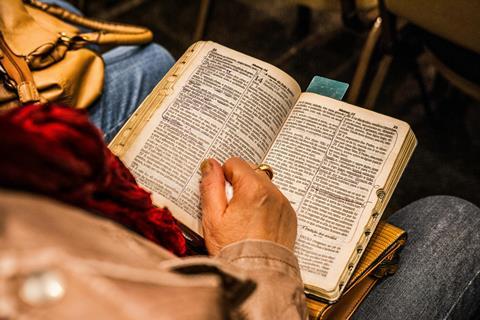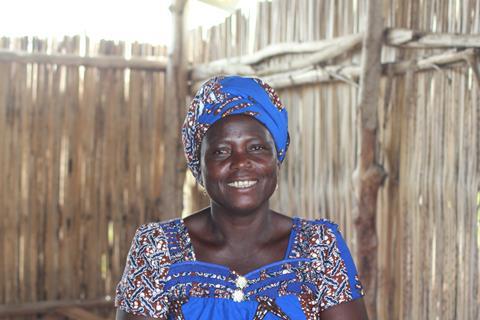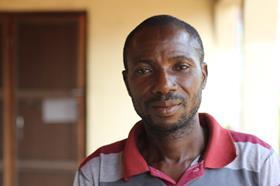On World Literacy Day, James Poole from Wycliffe Bible Translators, explores how translation of the scriptures is speeding up and changing millions of lives for the better

“The biggest impact the New Testament has had,” says Komi Sena, an Ifè Bible translator in Togo, “is that the number of Christians and churches has grown hugely because people can understand the word of God in their language.” Before the Ifè translation started there weren’t many Ifè churches. “But now,” Komi says with a big smile on his face, “almost every Ifè village has a church.”
The Bible changes lives. Many of us have experienced the Bible change us personally, and many of us have seen the power of the Bible to change lives in our churches.
But fundamentally, for the Bible to change lives, as it is doing amongst the Ifè people in Togo, people first need to be able to understand what God is saying through his word.
1 in 5 people – that is over 1.5 billion people – around the world don’t yet have the Bible in their language. The message of hope, love, and salvation contained in God’s word is locked in languages they don’t understand.
This lack of scripture in people’s languages, has been referred to by Loren Cunningham, the founder of Youth With A Mission (YWAM), as the biggest obstacle to world mission.
But we are living at a time in history when that obstacle to world mission is being dismantled at an unprecedented rate.
The foundation of Bible translation
Today, more people than ever before can read or hear God’s word in the language that speaks most deeply to them. The past year has been another exceptional one for the ministry of Bible translation. Across the world there have been more completed translations of full Bibles and New Testaments than in any previous year. Alongside that there is more translation work starting and in progress than at any point in history.
These advances are not isolated successes but part of a global acceleration, as translation teams, churches, and mission agencies work in partnership to transform lives through scripture.

The work of the local church, as well as many other mission agencies, is built on the foundation of Bible translation. We know that where the Bible has been translated into people’s languages the church grows, people understand the gospel and come to know Jesus, and those who already know Jesus grow more deeply in their faith and discipleship.
“One thing that is absolutely clear is that Christian impact overlapped almost exactly with the incidence of translation of scripture,” says the missiologist, Lamin Sanneh. “In other words, there were very few places, if any, where Christian awakening had taken root where people didn’t have scriptures in the mother-tongue. In fact, I couldn’t think of any.”
The message of hope, love, and salvation contained in God’s word is locked in languages 1.5 billion people don’t understand.
That is exactly what happened with the Ifè church – when the Ifè New Testament was translated, the growth of the Ifè church took off. This pattern is reflected in many other places all over the world.
The work of Bible translation often goes together with literacy classes to enable people to learn to read and write. This not only enables people to read the translated Bible but also transforms their lives in many other ways. “I had never been to school,” says Adissa (pictured, right) who has attended Ifè literacy classes, “but now I can read the time, I can type my number on a phone, and I can now read the Ifè New Testament.”
Unlocking God’s word for every heart
While we give thanks to God for the incredible momentum in Bible translation, there is still much more to do. While the Ifè people can see the difference having the New Testament makes, they also long to have the Old Testament in their language.

“I’m facing a big challenge in my ministry,” Ifè pastor Kodya Odah (pictured, right) explains. “Since I can’t speak or read French, I can’t use the Old Testament. I am praying that God helps the translation team with the Old Testament translation, so that we can have the whole Bible. It will really help me to be able to go through the Old Testament in my teaching.”
The Ifè translation team is hard at work on the Old Testament and the time is in sight – in the next number of years – Pastor Odah will have the joy of being able to read and preach from the Old Testament for the first time.
We are living in an extraordinary moment in history when the greatest obstacle to world mission is being dismantled. Bible translation is not about producing books on shelves. It is about unlocking eternal hope.
It is about giving people the opportunity to hear God speak to them in the language they dream in, laugh in, and cry in. It is about churches strengthened, disciples deepened, and whole communities transformed.
“Translating the Bible is so important,” says Komi Sena, “because many people are not able to read and understand the scriptures. And the Bible cannot change their lives when they do not understand it.”


































1 Reader's comment